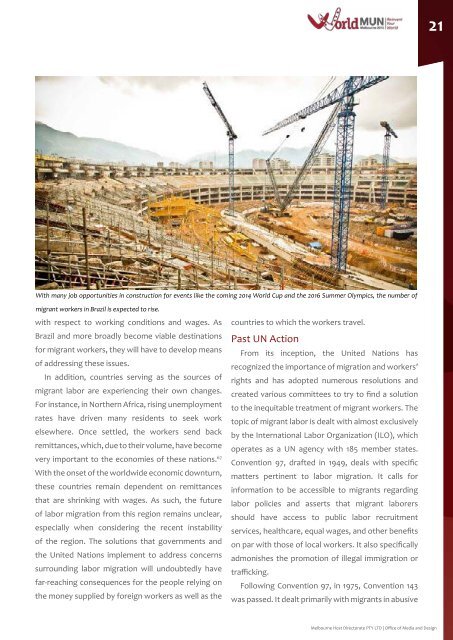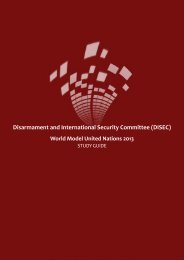SPECPOL - World Model United Nations
SPECPOL - World Model United Nations
SPECPOL - World Model United Nations
You also want an ePaper? Increase the reach of your titles
YUMPU automatically turns print PDFs into web optimized ePapers that Google loves.
With many job opportunities in construction for events like the coming 2014 <strong>World</strong> Cup and the 2016 Summer Olympics, the number of<br />
migrant workers in Brazil is expected to rise.<br />
with respect to working conditions and wages. As<br />
Brazil and more broadly become viable destinations<br />
for migrant workers, they will have to develop means<br />
of addressing these issues.<br />
In addition, countries serving as the sources of<br />
migrant labor are experiencing their own changes.<br />
For instance, in Northern Africa, rising unemployment<br />
rates have driven many residents to seek work<br />
elsewhere. Once settled, the workers send back<br />
remittances, which, due to their volume, have become<br />
very important to the economies of these nations. 67<br />
With the onset of the worldwide economic downturn,<br />
these countries remain dependent on remittances<br />
that are shrinking with wages. As such, the future<br />
of labor migration from this region remains unclear,<br />
especially when considering the recent instability<br />
of the region. The solutions that governments and<br />
the united <strong>Nations</strong> implement to address concerns<br />
surrounding labor migration will undoubtedly have<br />
far-reaching consequences for the people relying on<br />
the money supplied by foreign workers as well as the<br />
countries to which the workers travel.<br />
Past uN Action<br />
From its inception, the <strong>United</strong> <strong>Nations</strong> has<br />
recognized the importance of migration and workers’<br />
rights and has adopted numerous resolutions and<br />
created various committees to try to find a solution<br />
to the inequitable treatment of migrant workers. The<br />
topic of migrant labor is dealt with almost exclusively<br />
by the International Labor Organization (ILO), which<br />
operates as a UN agency with 185 member states.<br />
Convention 97, drafted in 1949, deals with specific<br />
matters pertinent to labor migration. It calls for<br />
information to be accessible to migrants regarding<br />
labor policies and asserts that migrant laborers<br />
should have access to public labor recruitment<br />
services, healthcare, equal wages, and other benefits<br />
on par with those of local workers. It also specifically<br />
admonishes the promotion of illegal immigration or<br />
trafficking.<br />
Following Convention 97, in 1975, Convention 143<br />
was passed. It dealt primarily with migrants in abusive<br />
21<br />
Melbourne Host Directorate PTY LTD | Office of Media and Design

















